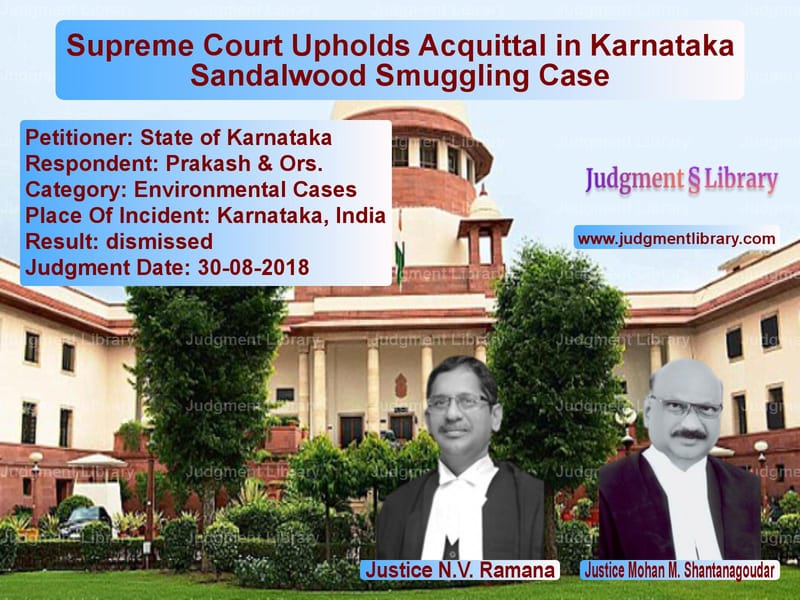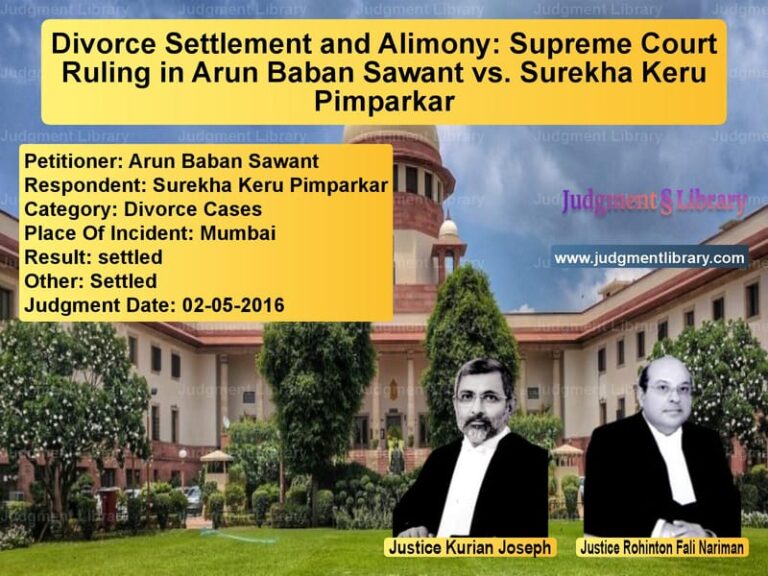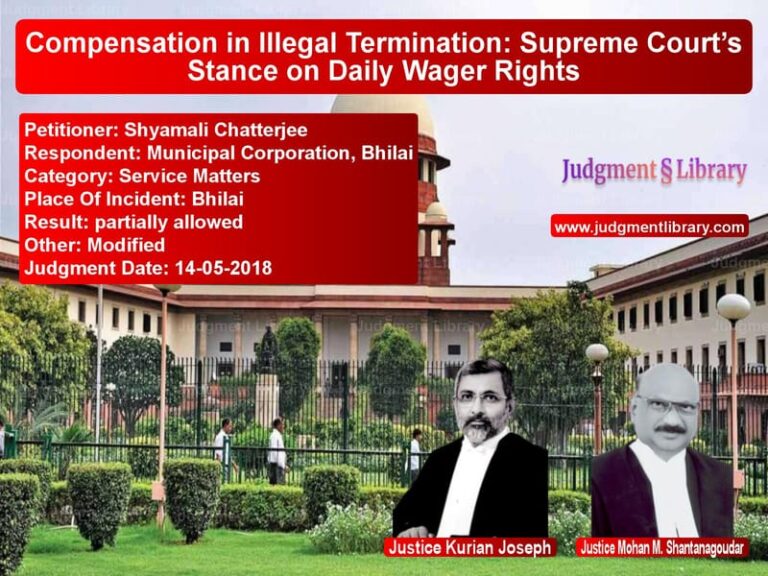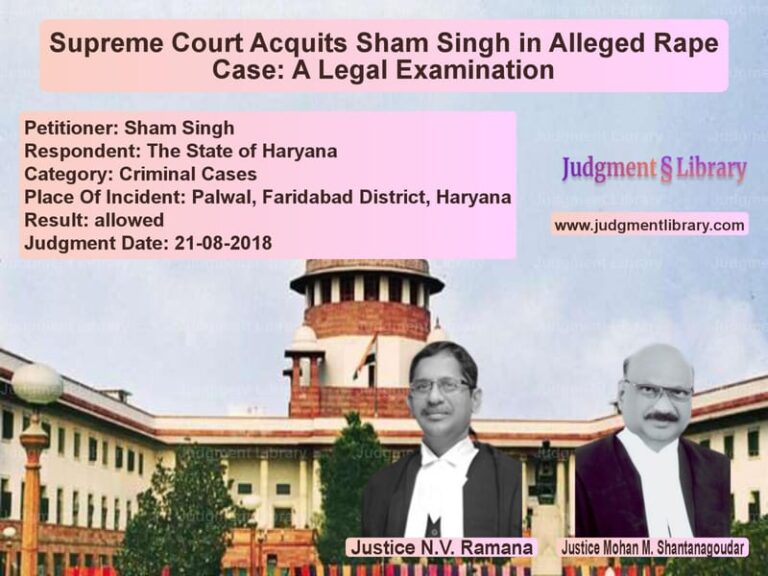Supreme Court Upholds Acquittal in Karnataka Sandalwood Smuggling Case
The Supreme Court of India, in its judgment dated August 30, 2018, ruled on an appeal concerning the illegal transportation of sandalwood in Karnataka. The case, State of Karnataka vs. Prakash & Ors., involved multiple appeals against High Court decisions that acquitted the accused charged under the Karnataka Forest Act and the Indian Penal Code (IPC). The Supreme Court upheld the acquittals, ruling that procedural lapses and failure to comply with mandatory provisions under the Karnataka Forest Act rendered the prosecution’s case weak.
This judgment reinforces the importance of following proper procedures in forest law enforcement and highlights how lapses in investigation can lead to acquittals in cases of alleged environmental crimes.
Background of the Case
The prosecution’s case was based on allegations that the accused were found transporting sandalwood in private vehicles when they were intercepted by the Range Forest Officer. The accused were charged under Section 87 of the Karnataka Forest Act (related to illegal possession and transportation of forest produce) and under Sections 379 and 34 of the IPC (related to theft and common intention).
The trial court convicted the accused and sentenced them to five years of simple imprisonment with a fine of Rs. 50,000 each. However, the Karnataka High Court overturned the conviction, citing non-compliance with Section 62C of the Karnataka Forest Act, which mandates specific procedures for verifying seized forest produce. The State of Karnataka then appealed to the Supreme Court, seeking reinstatement of the convictions.
Petitioner’s Arguments
The State of Karnataka argued that:
- The High Court erred in acquitting the accused based on technical lapses.
- The evidence clearly established that the accused were transporting sandalwood without authorization.
- The convictions should be restored because the prosecution had presented expert testimony confirming that the seized material was sandalwood.
Respondent’s Arguments
The defense, representing the accused, countered that:
- The prosecution failed to comply with Section 62C of the Karnataka Forest Act, which requires an authorized officer trained in identifying forest produce to certify the seized material.
- The investigating officers who issued the verification certificates had not received any training, making their certification invalid.
- The prosecution did not produce independent evidence to prove that the confiscated items were indeed sandalwood.
Supreme Court’s Observations
After reviewing the case, the Supreme Court agreed with the High Court’s findings. The Court held:
“The prosecution could not produce any evidence to show that the concerned Range Forest Officer who issued the certificate in the present cases was qualified to do the same as prescribed under the provisions of Section 62C of the Act.”
The Court further noted that procedural safeguards are essential in criminal cases, especially those involving environmental laws. It ruled that:
“Going by the material on record, it can be said that the prosecution has failed to prove that the requirements as contemplated under Section 62C of the Act were met by the concerned officers before issuing the impugned certificates.”
The Supreme Court emphasized that the prosecution failed to establish beyond a reasonable doubt that the confiscated items were sandalwood. The Court stated:
“There is no other admissible evidence on record in support of the prosecution case that the confiscated items were sandalwood billets.”
Final Verdict
The Supreme Court upheld the Karnataka High Court’s decision and dismissed the appeals, concluding:
“The High Court was right in setting aside the order of conviction and sentence passed by the trial court by reaching the conclusion that the offence under Section 87 of the Act cannot be said to have been established against the accused in accordance with law.”
Conclusion
The ruling in State of Karnataka vs. Prakash & Ors. underscores the necessity of procedural compliance in forest-related crimes. The judgment clarifies that failure to adhere to statutory requirements, such as those under Section 62C of the Karnataka Forest Act, can result in acquittals even in cases involving serious allegations like sandalwood smuggling. It highlights the role of due process in ensuring fair trials and preventing wrongful convictions based on procedural shortcomings.
Petitioner Name: State of Karnataka.Respondent Name: Prakash & Ors..Judgment By: Justice N.V. Ramana, Justice Mohan M. Shantanagoudar.Place Of Incident: Karnataka, India.Judgment Date: 30-08-2018.
Don’t miss out on the full details! Download the complete judgment in PDF format below and gain valuable insights instantly!
Download Judgment: State of Karnataka vs Prakash & Ors. Supreme Court of India Judgment Dated 30-08-2018.pdf
Direct Downlaod Judgment: Direct downlaod this Judgment
See all petitions in Public Interest Litigation
See all petitions in Environmental Cases
See all petitions in Legal Malpractice
See all petitions in Judgment by N.V. Ramana
See all petitions in Judgment by Mohan M. Shantanagoudar
See all petitions in dismissed
See all petitions in supreme court of India judgments August 2018
See all petitions in 2018 judgments
See all posts in Environmental Cases Category
See all allowed petitions in Environmental Cases Category
See all Dismissed petitions in Environmental Cases Category
See all partially allowed petitions in Environmental Cases Category







